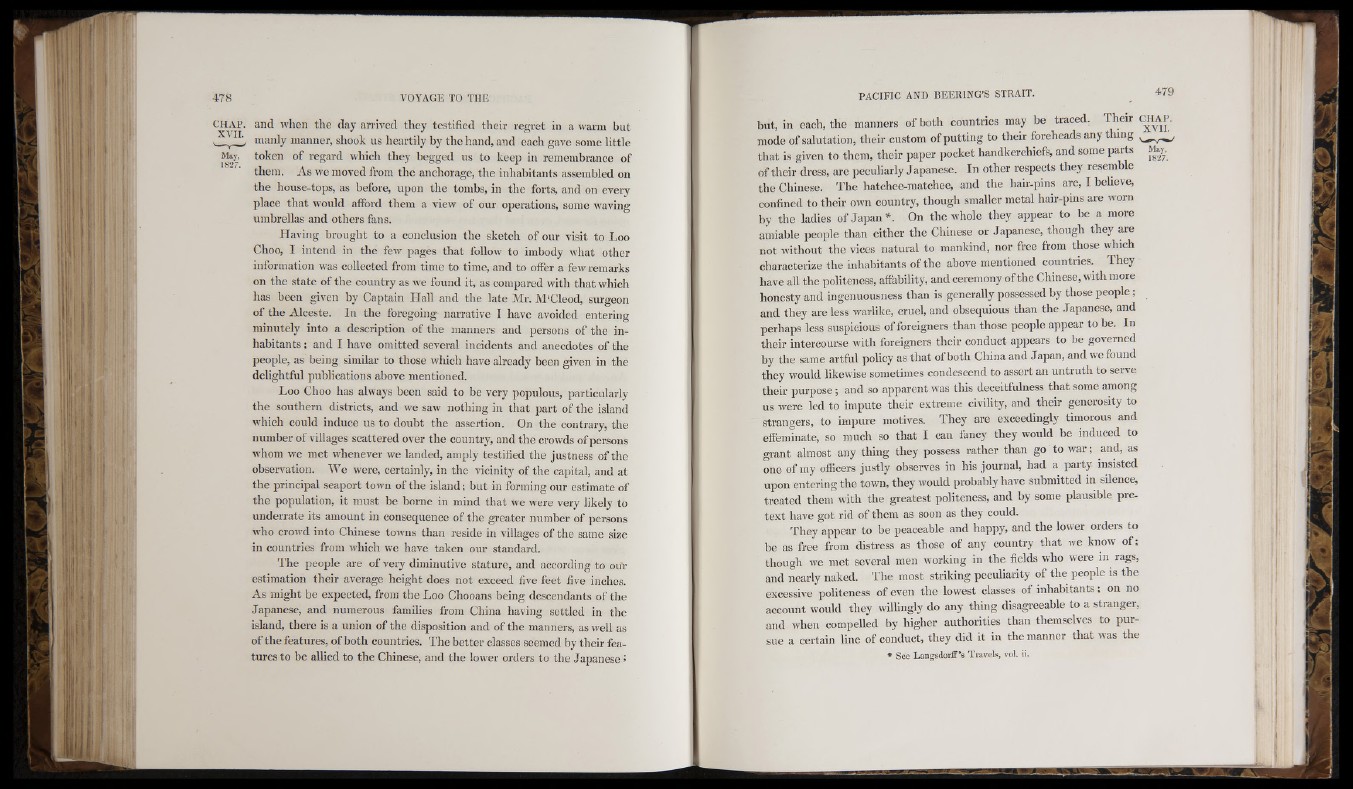
C H A P , and wlien the day arrived they testified their regret in a warm but
May,
1S2';.
manly manner, shook us heartily by tbe hand, and each gave some little
token of regard which they begged us to keep iu remembrance of
them. As we moved from tbe anchorage, tbe Inhabitants assembled on
the house-tops, as before, upon the tombs, in tbe forts, and on every
place that would afford them a view of our operations, some waving
umbrellas and others fans.
Having brought to a conclusion tbe sketch of our visit to Loo
Choo, 1 intend in tbe few pages that follow to imbody what other
information was collected from time to time, and to offer a few remarks
on the state of tbe country as we found it, as compared with that which
has been given by Captain Hall and tbe late Jlr. M'Cleod, surgeon
of the Alceste. In tbe foregoing narrative I have avoided entering
minutely into a description of tbe manners and persons of tbe inhabitants
; and I have omitted several incidents and anecdotes of the
people, as being similar to those which have already been given in the
delightful publications above mentioned.
Loo Choo has always been said to be very populous, particularly
tbe southern districts, and we saw nothing in that part of the island
which could induce us to doubt the assertion. On the contrary, the
number of villages scattered over tbe country, and the crowds of persons
whom we met whenever we landed, amply testified tbe justness of the
observation. W e were, certainly, in the vicinity of the capital, and at
the principal seaport town of the island ; but in forming our estimate of
the population, it must be borne in mind that we were very likely to
underrate its amount in consequence of the greater number of persons
who crowd into Chinese towns than reside in villages of the same size
in countries from which we have taken our standard.
'I'he people are of very diminutive stature, and according to our
estimation their average height does not exceed five feet five inches.
As might be expected, from the Loo Chooans being descendants of the
Japanese, and numerous families from China having settled in the
island, there is a union of the disposition and of the manners, as well as
of the features, of both countries. The better classes seemed by their features
to be allied to the Chinese, and tlie lower orders to tbe Japanese I
!i;i I II
liiSiJI,
Their C H A P .
X V I I . but, in each, the manners of both countries may be traced,
mode of salutation, tbeir custom of putting to tbeir foreheads any thing ,
that is given to them, their paper jiocket handkerchiefs, and some parts
of their dress, are peculiarly Japanese. In other respects they resemble
the Chinese. The hatchee-matchee, and tbe hair-pins are, I believe,
confined to their own country, though smaller metal hair-jiins are worn
by the ladies of Japan*. On the whole they appear to be a more
amiable people than either the Chinese or Japanese, though they are
not without the vices natural to mankind, nor free from those which
characterize the inhabitants of the above mentioned countries. They
have all the politeness, affability, and ceremony of tbe Chinese, with more
honesty and ingenuousness than is generally possessed by those people;
and they are less warlike, cruel, and obsequious than the Japanese, and
perhaps less suspicious of foreigners than those people appear to be. In
their intercourse with foreigners their conduct appears to be governed
by tbe same artful policy as that of both China and Japan, and we found
they would likewise sometimes condescend to assert an untruth to serve
tbeir purpose; and so apparent was this deceitfulness that some among
us were led to impute their extreme civility, and their generosity to
strangers, to impure motives. They are exceedingly timorous and
effeminate, so much so that I can fancy they would be induced to
grant almost any thing they possess rather than go to war; and, as
one of my officers justly observes in his journal, had a party insisted
upon entering the town, they would probably have submitted in silence,
treated them with tbe greatest politeness, and by some plausible pretext
have got rid of them as soon as they could.
They appear to be peaceable and happy, and the lower orders to
be as free from distress as those of any country that we know of;
though we met several men working in the fields who were in rags,
and nearly naked. The most striking peculiarity of the people is the
excessive politeness of even the lowest classes of inhabitants; on no
account ivould they willingly do any thing disagreeable to a stranger,
and when compelled by higher authorities than themselves to pursue
a certain line of conduct, they did it in the manner that was the
• See L an g sd o rff’s T rav els, vol. ii.
3s-'•via»)